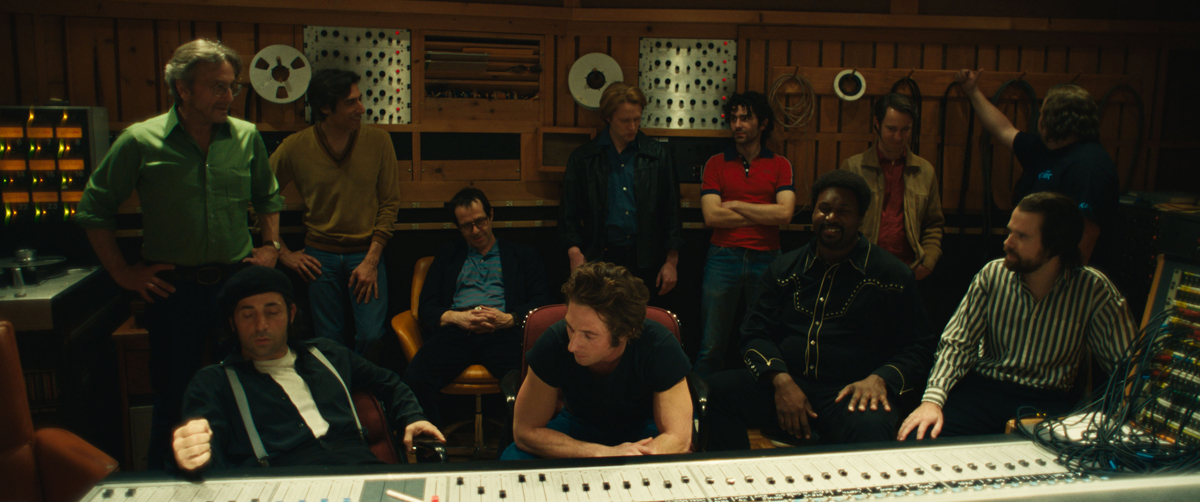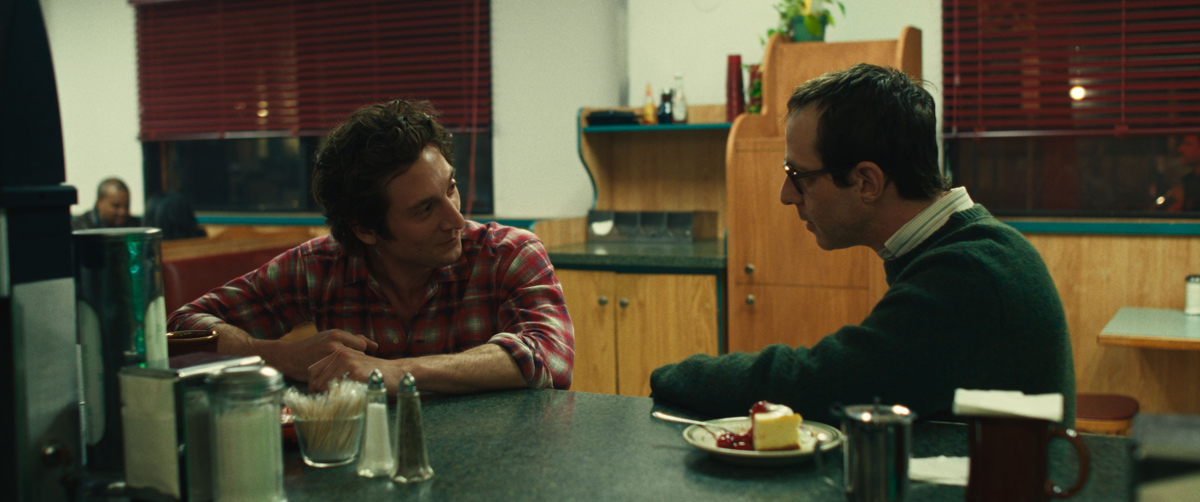 Andrew Chan
Andrew Chan
Who was the Boss?: the musician’s outsize influence in Scott Cooper’s new biopic makes for too tidy of a story.

Jeremy Allen White as Bruce Springsteen in Springsteen: Deliver Me from Nowhere. Courtesy 20th Century Studios. © 20th Century Studios.
Springsteen: Deliver Me from Nowhere, written and directed by Scott Cooper, now playing in theaters
• • •
Has there ever been a showbiz movie as stultifyingly virtuous as Springsteen: Deliver Me from Nowhere? The man at its center—a salt-of-the-earth celebrity whose public persona has remained untainted by bad behavior for more than five decades—hardly lends himself to the kind of hedonistic spectacles associated with musical biopics. Additionally, the period of his life under examination is one of ascetic self-denial. In the early 1980s, Bruce Springsteen (played by a sluggish, permanently wincing Jeremy Allen White) was on the brink of global superstardom, following an international tour and his first top-ten single. Shrinking away from his own fame, he retreated to a quiet corner of his native New Jersey, where he crafted a suite of austere character studies that he still considers his best work—1982’s all-acoustic Nebraska. As the film would have us understand it, the album’s launch epitomizes Springsteen’s predilection for purity during this stretch of his career: he mandated that there be no press interviews, no audience-friendly radio edits, no portrait on the cover, no explanation for a magnum opus designed to stand on its own uncompromising terms.

Jeremy Allen White as Bruce Springsteen in Springsteen: Deliver Me from Nowhere. Courtesy 20th Century Studios. Photo: Macall Polay. © 20th Century Studios.
The irony of Deliver Me from Nowhere is that it counteracts such abstention. Little more than a thinly fleshed-out press release, the movie—written and directed by Scott Cooper—relentlessly hammers home the modesty of the rollout, as if this were an unimpeachable demonstration of Springsteen’s noble intentions. Drawing heavily from a 2023 book about Nebraska by Warren Zanes, Cooper devotes much of his effort to dramatizing the unorthodox process of the album’s creation. After years of fronting the E Street Band—whose soaring, elaborate instrumentation gave Springsteen’s breakthrough record, 1975’s Born to Run, its operatic majesty—the Boss was in pursuit of a leaner, grittier sound. He turned to the TEAC 144 Portastudio, a consumer-grade four-track recorder that enabled him to capture his songs, sparsely arranged with vocals, harmonica, and guitar, in the privacy of his bedroom.

Jeremy Allen White as Bruce Springsteen in Springsteen: Deliver Me from Nowhere. Courtesy 20th Century Studios. © 20th Century Studios.
It’s rare for Hollywood movies to depict the minutiae of popular-music production, which is why the film’s fetishistic focus on engineering merits some attention. In Deliver Me from Nowhere’s first overture to audiophiles and gearheads, technician Mike Batlan (Paul Walter Hauser) brings the mythical TEAC to Springsteen’s house and helps him operate it. Then, following a prolonged effort at redoing the Nebraska songs on professional equipment, the singer stubbornly insists that Columbia Records release the material in all its raw glory (the demo tape is so raw, in fact, that it’s delivered hand to hand without a plastic case), leading to an illustration of the difficulties in transferring such lo-fi audio to vinyl. Though clunkily reimagined for the screen (and rendered much more compellingly in Zanes’s book), this nerdy history of machines does inject a modicum of suspense into a drama void of any stakes.

Jeremy Allen White as Bruce Springsteen (center foreground) and cast in Springsteen: Deliver Me from Nowhere. Courtesy 20th Century Studios. © 20th Century Studios.
Cooper’s thesis-like screenwriting posits the album primarily as a victory for technological innovation and a paragon of anti-marketing. What gets lost are the songs themselves, only a few of which are played at length. The film treats Nebraska as a sacred text while keeping the music at a distance, a choice that points to something I’ve had to come to terms with over many years of Springsteen fandom: this album just isn’t very good.

Jeremy Allen White as Bruce Springsteen in Springsteen: Deliver Me from Nowhere. Courtesy 20th Century Studios. © 20th Century Studios.
Renouncing the anthemic, stadium-size grandeur of his early masterpieces, Nebraska self-importantly proposes itself as an inheritor of the American gothic tradition. Cooper shows us the singer watching The Night of the Hunter in a movie theater as a child, perusing an anthology of Flannery O’Connor’s short stories, and stumbling onto Badlands while channel surfing—as if this sort of cultural mood-boarding were a reliable measure of seriousness. But the album has none of the dynamism or troubling ambiguity of these touchstones. Springsteen may have earnestly thought of Nebraska as his way of reconnecting to the hardscrabble conditions in which he grew up (and from which success alienated him), but the songs condescend to their working-class protagonists, robbing them of emotional nuance with anemic melodies and heavy-handed lyrics.

Jeremy Allen White as Bruce Springsteen and Odessa Young as Faye in Springsteen: Deliver Me from Nowhere. Courtesy 20th Century Studios. © 20th Century Studios.
Whereas the best of Springsteen’s discography walks the thin line between hope and despair, romance and realism, Nebraska is satisfied with sounding its one long, bland note of fatalism. Cooper tries to mitigate this starkness with a few sentimental tropes, including a dead-end courtship with a fictional female martyr named Faye (a floundering Odessa Young) and black-and-white flashbacks to the hero’s tempestuous youth in the shadow of his abusive father (Stephen Graham). But because Nebraska was an uncharacteristically solitary project for Springsteen, we don’t get more than an abstract sense of what he was like in the company of his colleagues, fans, or loved ones. The messianic passion and boyish, sometimes goofy charisma that made him a galvanizing band leader—qualities on display in several legacy-burnishing documentaries, such as 2010’s The Promise: The Making of Darkness on the Edge of Town—are entirely absent here. The close bond between the singer and his longtime manager, Jon Landau (Jeremy Strong), is given a notable amount of screen time, but the tensions in their part-fraternal, part-contractual relationship are obscured by a surfeit of levelheaded decision-making, exemplified by the moment when Landau urges his depressed friend to seek “professional help.”

Jeremy Allen White as Bruce Springsteen and Jeremy Strong as Jon Landau in Springsteen: Deliver Me from Nowhere. Courtesy 20th Century Studios. © 20th Century Studios.
In a film that never manages to find its climax (and seems incapable of depicting the album’s impact after its release), Springsteen’s first trip to the shrink’s office is the closest we get to any sort of pinnacle. This scene—soon followed by one in which the thirty-four-year-old singer sits on Daddy’s lap, all sins forgiven—suggests why the movie hits none of its dramatic marks: the protagonist’s torments are delivered to us predigested, his compulsions explained away as symptoms of childhood trauma. The influence of Springsteen the elder statesman is so palpable throughout the movie, it’s no wonder White appears to be cowering onscreen, as if he were the child desperate to pacify a fearsome patriarch. (According to Cooper and White, Springsteen was frequently on set.) In Zanes’s book, the singer calls Nebraska “an accident from start to finish,” but Deliver Me from Nowhere envisions the record as something that makes perfect sense—a work of social decency and artistic respectability free of the combustible passions that fuel rock and roll.
Andrew Chan is a writer and editor living in Brooklyn, New York. He is the author of Why Mariah Carey Matters, published by University of Texas Press.